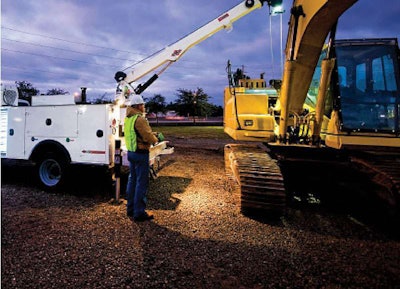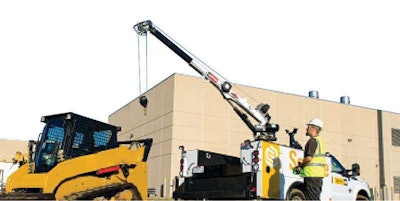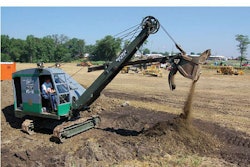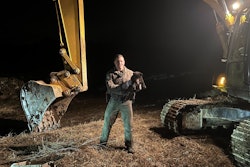Fleet managers SPEAK OUT on the technician shortage

By Tom Jackson
Doug King knows all too well that good diesel mechanics are hard to find. King is an Association of Equipment Management Professionals, Certified Equipment Manager* who oversees more than 900 pieces of heavy equipment and trucks, 23 technicians, four equipment managers and five drivers for Sherwood Construction, El Dorado, Kansas. He recently lost his best mechanic to retirement. The man was 71 years old.
Not only was he King’s most productive mechanic, he was loyal to a fault.
“It was not because he couldn’t afford to retire,” King says. “He just didn’t feel comfortable leaving us.”
That’s what’s known as the “old school work ethic,” and for a variety of reasons it’s disappearing, as are the people with the skills to do this work and even people who want to do this kind of work.
The shortage of qualified diesel techs is so severe that fleet managers, equipment dealers and equipment manufacturers are pulling out all the stops to bring new people into the business. But there is no easy fix. In April, Equipment World sat down with a group of equipment fleet managers at AEMP’s annual convention and asked them to tell us about the challenges they faced in recruiting, training and keeping mechanics and technicians – and if they had any solutions. Here’s what they had to say:
The hands off generation
Most kids today don’t like to work with their hands. Some of this can be blamed on their environment, but some of it is the fault of the industry, too.

Even up until the mid-1990s the United States maintained a tradition of giving all young men and many women in middle school and high school some exposure to the industrial arts. Shop class was routine for young men and home economics for women, and not just for kids who had no hope of going to college.
That education brought with it an appreciation of the manual arts and a work ethic that has gone missing since America’s educators have decided to focus on book knowledge to the exclusion of all other forms.
Today, laments Howie Howerton, who manages a fleet of 900 pieces of equipment for Waste Management in the southern United States, most young men can’t even change the oil in their cars – including his own two sons.
Ugly shop syndrome
So kids today get little if any exposure to the manual arts, but what they do see when they do get some exposure, is usually not an attractive picture, say these fleet managers.
Howerton suggests looking at the working conditions in a modern auto dealers’ shop to see what the competition for mechanics looks like. “How long has it been since you saw an auto dealer where the shop was dingy and the lighting was bad and the floors pockmarked and pitted?” he asks. “Mechanics today look at the working conditions, and the auto dealerships have a lot better looking shops than truck and heavy equipment shops.”
King concurs. The auto shops have Wi-Fi hot spots, white painted walls, nice coffee machines and a professional appearance, he says. In other words, they’re attractive places to work.
Or take a look at any of the cable TV shows for truck, automotive and motorcycle enthusiasts. The shops not only look sharp, but you can eat off the floors, and that has a lot of appeal to today’s youth.
Several fleet managers we spoke to have already done a lot to improve the look and perception of their shops as great places to work. “We completely redid our shop,” King says. “We relit it and painted it inside and out and scrubbed the floor. We have people coming in to apply for jobs and we want them to have a good perception.”
Long hours, hard work
For the generation of mechanics and technicians now getting close to retirement, long hours, difficult conditions, travel and overtime were just part of the job. Agree with it or not, today’s kids want to put in their 40 hours and be home in time for dinner every night.
This distaste for long hours and hard work is a problem in all career fields, not just construction and mechanic work. What fleet managers can do to encourage young people to stay in this business, say our fleet managers, is to strive to make work less of a burden. Old school types may not agree, but old school isn’t cutting it anymore.
“There is a lot more travel required for mechanics today,” says Sean Schoedel, EMS, who manages 11 technicians for Joseph B. Fay Company in Pittsburgh, Pennsylvania. “Sometimes they have to be out of town and that can be an inconvenience. We’ve had other people offer them the ability to be home at night.”
Since he can’t change the requirements of the job, Schoedel says he works with the company human resources department to offer the most attractive compensation/benefits package possible. This includes a generous PTO policy and uniforms. “But our recognition of the value of our employees and team camaraderie keeps them here,” he says. “I try to give them an enjoyable environment to work in, because that’s one of the things people appreciate. They want a satisfying place to work and that’s one thing that I personally can do.”
Creating a pleasant work environment is not all that difficult or expensive, Schoedel says. “Every individual is different in what motivates them. Some people just like a pat on the back, some like their birthdays recognized. I know that sounds silly but it’s the little things that matter. I know what is most important to each of my mechanics.”
Another low-cost, high impact suggestion comes from Jerry Sloan, CEM, who does support work for Waste Management. Sloan says an awards banquet his company puts on for the best shop of the year does a lot of good for morale and retention. The award is based on preventive maintenance and OSHA reportables and the CEO of the company comes in to give out the awards.
Money matters
The law of supply and demand has boosted wages for mechanics to competitive levels in many parts of the country. For $12 or $15 an hour, most young people would rather just work at Walmart and not get as dirty or face as much stress, Schoedel says.
Gary Beerbower, CEM, who oversees Waste Management’s fleet operations in the Western states, says their ads for technicians at $25 an hour got no response in Phoenix, Arizona, but when they bumped it to $30 an hour they got a better response. These were experienced techs, but many were coming from the local dealer too, which Beerbower admits doesn’t solve the problem of increasing the number of techs in the industry.
But in Western Canada, North Dakota, some parts of Louisiana and Texas – and anywhere where there are oils sands, shale oil or natural gas development work – techs are getting $50 to $60 an hour to start, says Mike Richardson, CEM, a heavy equipment manager at Waste Management.
And for fleets in the rest of the country, that’s part of the problem.
The wages being offered in the new oil patch are not only record breaking, but the volume of work is such that it’s attracting huge numbers of techs. The fleet managers we spoke with thought that it might be easier coming out of the recession to rehire techs and mechanics who were laid off in the downturn, but many of those went to where the energy business was booming and have yet to return.
Wage competition also comes from other trades. King tells a revealing story about his own son, who worked with him doing heavy equipment maintenance part time in the summers.
“I would have liked to have my son become a mechanic,” King says, “but when it came time to make that career choice, he decided to become an electrician. He can make more money at that than we can pay him and he probably made the right choice.”
These fleet managers will only go so far when it comes to wage wars. Offering somebody a few cents more an hour to entice them away from their current job is usually counterproductive.
“There is always going to be somebody somewhere else who is going to pay more than you do, so we decided we were going to pay what we feel is the right wage,” King says. “We’ll do everything we can to keep the ones we have, and in the last couple of years we haven’t lost any to the competition.”
Recruiting the next generation
The days of placing an ad in the newspapers and having your pick of candidates are long gone, say these fleet managers. Not surprisingly, the most successful recruiting strategies are similar to those used in many of today’s top corporations – recruit early, recruit often and find people though word of mouth.
Although the payoff may be years away, junior high and middle school outreach is working for some. King’s company has made presentations to kids in local junior high schools and had several of these kids come to work for it after high school, although as operators and laborers, not mechanics. Still, says King, “That hour we spent 10 years ago in junior high bore more fruit than the hours we’ve spent at high schools and even our job shadowing program.”
Howerton has also recruited successfully in junior high schools as well as high schools and colleges and done some job shadowing where young kids follow a mechanic around for a day or so and see what the work is like. “There has been payoff down the road,” he says. “We’ve actually been doing it long enough that we’ve got a couple of guys working for us who first found out about us when they were in junior high.”
But schools can be a tough nut to crack, warns Richardson, who manages 1,300 pieces of equipment for Waste Management in the Midwest. “Way too many of our counselors won’t talk to the kids unless they’re going to college. They don’t steer them in the direction we need them to go. We’ve got the same problems with electricians and plumbers.”
Another successful recruiting strategy is word of mouth. “Mechanics and technicians run in circles,” Schoedel says.
“You have to be able to infiltrate them. That’s how I’ve gotten three of mine, just by talking to my guys and asking them.”
Fierce competition
Mechanics mustering out of the military are also a great source for well trained, well disciplined workers, but be advised, competition for these men and women is fierce. “I have a grandson who gets out of the Marine Corp in a year, and he has already had five job offers because of his training as a heavy equipment mechanic,” says Sloan.
Construction company fleet managers must also compete against equipment dealers, many of which have nationally funded outreach programs to find, train and employ young technicians. Even so, the dealers are struggling as well.
“I had a meeting with a dealer last week and they were giving us response times of one to two weeks if a machine broke down,” says Beerbower – an experience shared by many of the fleet managers in our group. “Their only excuse was that they don’t have the techs,” Beerbower says.
“It’s gotten worse in the last few years. I thought it might have been the economy and all the layoffs and I thought it would get better, but it didn’t.”
TAKEAWAYS
1. Spiff up the shop. If it’s dingy, repaint and relight. Make it a recruiting showplace.
2. Get with your HR people and maximize the benefits package you can offer. Take a hard look at flex times, comp time, personal time and other arrangements if your techs have to travel a lot.
3. Praise your people. You don’t have to be a drill sergeant to get good results.
4. Pay a competitive wage but don’t engage in bidding wars with other shops.
5. Start recruiting in junior high and middle school.
6. Spread the word. Ask the techs you have now who they know that might be a good prospect. Have your company sponsor a local sports team or youth activity and talk to the kids you meet there.
*The AEMP is dedicated to the professional development of heavy equipment and truck fleet managers. It offers three levels of study and certification including the Certified Equipment Manager (CEM), Equipment Manager Specialist (EMS), and the Certified Equipment Support Professional. For more information visit: www.aemp.org/education/certification/about_certifications.html.












